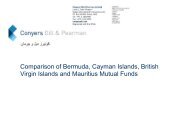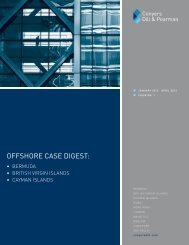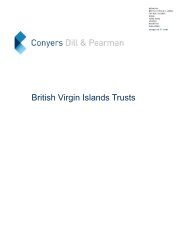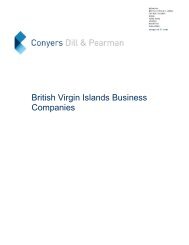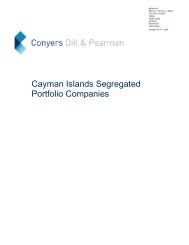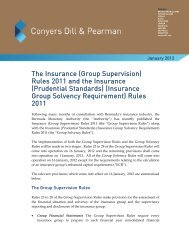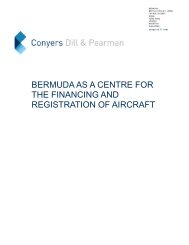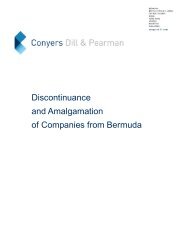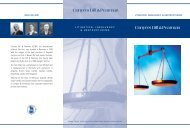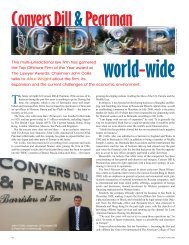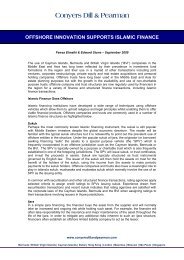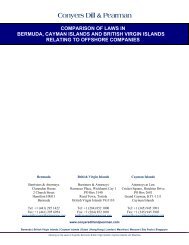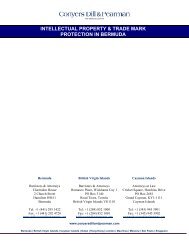Private Trust Companies - Bermuda - Conyers Dill & Pearman
Private Trust Companies - Bermuda - Conyers Dill & Pearman
Private Trust Companies - Bermuda - Conyers Dill & Pearman
Create successful ePaper yourself
Turn your PDF publications into a flip-book with our unique Google optimized e-Paper software.
The International Offshore Law Firm<br />
<strong>Private</strong> <strong>Trust</strong> <strong>Companies</strong><br />
<strong>Bermuda</strong><br />
BERMUDA ANGUILLA BRITISH VIRGIN ISLANDS CAYMAN ISLANDS HONG KONG LONDON SINGAPORE
Foreword<br />
The <strong>Trust</strong> and <strong>Private</strong> Client practice at <strong>Conyers</strong> <strong>Dill</strong> & <strong>Pearman</strong> has been structuring<br />
<strong>Private</strong> <strong>Trust</strong> <strong>Companies</strong> ("PTCs") in <strong>Bermuda</strong> for over 25 years and is internationally<br />
recognised as a leader in the field. We are also experienced in establishing PTCs under<br />
the laws of the British Virgin Islands and Cayman Islands where we have fully serviced<br />
legal offices and affiliated service companies.<br />
Comprising one of the largest and most experienced offshore trust and private client<br />
practices in the world, we advise individuals, families and corporate clients on a broad<br />
range of issues concerning estate planning and private investment structures, and on<br />
regulatory laws affecting business transactions and personal assets.<br />
This booklet contains a general discussion and commentary on various issues pertinent<br />
to PTCs, and we have included some supporting materials. We hope that this booklet<br />
will be of assistance to our clients and their advisors who are considering establishing a<br />
PTC in <strong>Bermuda</strong>. The materials deal in broad terms with the requirements of <strong>Bermuda</strong><br />
law and are not intended to be exhaustive in scope. We have also included some background<br />
information on <strong>Conyers</strong> <strong>Dill</strong> & <strong>Pearman</strong> and its affiliated trust company, Codan <strong>Trust</strong><br />
Company Limited.<br />
<strong>Conyers</strong> <strong>Dill</strong> & <strong>Pearman</strong><br />
Hamilton, <strong>Bermuda</strong><br />
October 2005
Contents<br />
1. Introduction 1<br />
1.1 <strong>Bermuda</strong> definition of a PTC 1<br />
1.2 A popular solution for International Clients 1<br />
1.3 Examples of typical PTC structures 1<br />
2. Rationales for establishing a PTC 2<br />
2.1 Control 2<br />
2.2 Familiarity and continuity 2<br />
2.3 Control of Confidential Information 2<br />
2.4 Administrative Flexibility 3<br />
2.5 Cost 3<br />
2.6 Family Education and Governance 3<br />
2.7 <strong>Trust</strong>ee liability 3<br />
3. Setting up a private trust company 4<br />
4. Ownership of the PTC 5<br />
5. Due Diligence on the Principals 5<br />
6. Timescale for incorporation 6<br />
7. Capital and funding 6<br />
8. Directors, officers and agents 6<br />
9. Registered office 7<br />
10. Meetings 7<br />
11. Confidentiality of <strong>Trust</strong> Records 7<br />
12. Company's and directors' liability 8<br />
12.1 Liability of company 8<br />
12.2 Liability of directors and officers 8<br />
13. Taxation 9<br />
Schematic of a PTC Structure 10<br />
Schedule 1 11<br />
Schedule 2 12<br />
Schedule 3 13, 14<br />
Schedule 4 15<br />
<strong>Conyers</strong> <strong>Dill</strong> & <strong>Pearman</strong> 16<br />
Codan <strong>Trust</strong> 17<br />
Contacts 18
1. <strong>Private</strong> <strong>Trust</strong> <strong>Companies</strong><br />
in <strong>Bermuda</strong><br />
1.1 <strong>Bermuda</strong> definition of a PTC<br />
In <strong>Bermuda</strong>, a <strong>Private</strong> <strong>Trust</strong> Company ("PTC") is a company whose sole purpose is<br />
to act as a trustee for a specific trust or a related group of trusts. Typically, the PTC<br />
will act as trustee for one or more trusts which relate to a particularly family and<br />
their relatives.<br />
A <strong>Bermuda</strong> PTC is exempt from the licensing requirements under the <strong>Trust</strong>s<br />
(Regulation of <strong>Trust</strong>s Business) Act 2001 (the "2001 Act") so long as it only<br />
provides trustee services to those trusts specified in its memorandum of association<br />
and by implication, does not offer such services to the public as a business or<br />
vocation. The exemption is provided for under section 3 of the <strong>Trust</strong>s (Regulation<br />
of <strong>Trust</strong> Business) Exemption Order 2002 (the “Exemption Order”).<br />
1.2 A popular solution for International Clients<br />
Although <strong>Bermuda</strong> has been incorporating PTCs for over 40 years (initially by<br />
<strong>Private</strong> Act of the Legislature), in recent years there has been a very considerable<br />
growth in interest and use of the PTC in <strong>Bermuda</strong> by international advisers due, in<br />
part, to the favourable regulatory environment.<br />
For the reasons outlined in paragraph 2 below, the PTC provides a flexible structure<br />
for substantially wealthy families in the international context. Very often the<br />
involvement of a PTC may resolve issues or concerns pertaining to the professional<br />
trustee or the settlor, such that it will facilitate the creation of a trust, whereas,<br />
without the PTC, the trust may not be feasible for one of the parties.<br />
1.3 Examples of PTCs structures<br />
Typically PTCs are used in the following examples:<br />
(i) a particular family discretionary trust or trusts owning separate proportions of<br />
shares of a private family business<br />
(ii) a family trust owning real estate, yachts or aircraft<br />
(iii) a trust owning commercial airline assets or operating in shipping businesses<br />
(iv) corporate pension trusts or executive or employee compensation benefit trusts<br />
(v) private charitable trusts<br />
(vi) a trust to own founder voting shares of a hedge fund or other investment fund<br />
(vii) a private unit trust or a unit trust which acts as an investment fund for<br />
numerous investors<br />
P A G E 1
2. Rationales for establishing a PTC<br />
Outlined in brief form below follows a description of some of the more common reasons<br />
why a PTC may be incorporated as part of an international trust structure.<br />
2.1 Control<br />
Settlors of trusts are sometimes reluctant to relinquish total control over and<br />
involvement with the assets settled into trust. Where tax and other considerations<br />
permit, and provided the PTC is administered properly by observing all correct<br />
formalities, a settlor and his family may retain a certain degree of control and<br />
involvement without prejudicing the legal validity of the trust structure.<br />
Where a settlor is not comfortable with a trust structure because of minimal<br />
experience, the corporate form of a PTC may be more familiar and easier for settlor<br />
to understand conceptually. Particularly where the client or his attorneys are based<br />
in civil law jurisdictions (in which there is often no legal concept of a "trust"), the<br />
PTC acts as a confidence "bridge" due to its familiar corporate form.<br />
2.2 Familiarity and continuity<br />
Settlors expect the trustee to be knowledgeable of and sensitive to their family's<br />
circumstances and to administer the trust accordingly. Through the involvement of<br />
family members and/or close family advisers on the board of directors, a PTC will<br />
tend to be more familiar with the settlor's family than an institutional trustee.<br />
Furthermore, the management personnel (i.e. directors and administrators) of a PTC<br />
is less likely to experience the disruption caused by the potential turnover of staff<br />
often seen in institutional trustees as employees are re-assigned or promoted.<br />
2.3 Control of Confidential Information<br />
Where the board of directors consists of family members and/or close personal<br />
advisers, the circulation and disclosure of information regarding the trust and the<br />
family's affairs may be more restricted than would be the case with an institutional<br />
trustee. For example, as PTCs are not regulated, their files are not subject to the<br />
potential inspection of the <strong>Bermuda</strong> Monetary Authority (the “BMA”) absent some<br />
unusual investigation.<br />
2.4 Administrative Flexibility<br />
A PTC is a tailor-made structure which is structured to best serve the settlor's<br />
intentions and the scope of its role and powers as trustee can be fine-tuned<br />
accordingly. A PTC will act as trustee only for the settlor's trust or group of trusts,<br />
and accordingly its trusteeship name will not be "shared" with other clients. This<br />
avoids any possibility of claims of an unrelated trust client from interfering or<br />
otherwise affecting the trusts of the PTC client. As a single purpose entity, a PTC<br />
will be designed to co-ordinate the trust administration with the family's independent<br />
investment, legal or tax advisers and (if applicable) a family office without<br />
the bureaucratic burden of complying with institutional trust regulation.<br />
This streamlines and simplifies administration.<br />
P A G E 2
2.5 Cost<br />
The annual fees of institutional trustees are usually calculated on an ad valorem<br />
basis and can be considerable where assets of significant value are placed in trust.<br />
By comparison, the costs of incorporating and running a PTC can be subject to<br />
client control and should be significantly less expensive for large trusts.<br />
2.6 Family Education and Governance<br />
A PTC provides a structured forum which can enhance the involvement of and<br />
education process of beneficiaries who will inherit large fortunes. At the level of<br />
the board of directors or sub-committees there will be opportunity to explain to<br />
beneficiaries how the family's financial assets are managed and where appropriate<br />
a mechanism to enable them to contribute to the decision-making process of the<br />
trustee. This creates a practical way of introducing adult beneficiaries to the<br />
principles of corporate governance and trustee duties, thereby overcoming some of<br />
the "unknown" and potential mistrust of the trustee's position.<br />
2.7 <strong>Trust</strong>ee liability<br />
Institutional trustees and individual professional trustees, increasingly concerned<br />
about their potential liability and the risk of being sued, can be reluctant to take on<br />
ownership of assets with perceived higher risks (e.g. high-risk capital investments,<br />
companies operating business assets such as ships or aircraft and commercial real<br />
estate). In light of the increasing risk of litigation from beneficiaries and tax<br />
liability for trustees, a professional or bank trustee will often be more agreeable to<br />
administering a trust through a PTC and providing directors rather than acting as<br />
trustee itself.<br />
If given a choice of acting as a trustee directly or as a director of a PTC, an<br />
individual would be well advised to choose the latter since this will enable him to<br />
minimize the risk of personal unlimited liability which flows from individual<br />
trusteeship. It is interesting to note that, due to the liability risks, many<br />
professional firms will not allow their principals to act as trustee of any client trust.<br />
The option of acting as a director of a PTC will encourage qualified professionals<br />
to accede to the client's request for him to act and at the same time serves to<br />
minimize litigation. If the PTC option were not offered, many quality trustees will<br />
prudently turn down their appointment.<br />
P A G E 3
3. Setting up a <strong>Private</strong><br />
<strong>Trust</strong> Company<br />
The BMA must approve the incorporation of all PTCs.<br />
In <strong>Bermuda</strong>, a PTC can be incorporated either as a company limited by shares or as a<br />
company limited by guarantee pursuant to the provisions of the <strong>Companies</strong> Act 1981.<br />
<strong>Bermuda</strong> law distinguishes between "local" companies (those which are owned<br />
predominantly by Bermudians) and "exempted" companies (those which are owned<br />
predominantly by non-Bermudians). Generally, with some exceptions, exempted<br />
companies may only carry on business from <strong>Bermuda</strong> in connection with transactions<br />
and activities which are external to <strong>Bermuda</strong>.<br />
The incorporation process does not require an application for a licence nor for a special<br />
exemption from licensing. Section 3(1) of the Exemption Order provides that “a trust<br />
company is exempted from the requirements of section 9 of the [2001] Act [to obtain a<br />
licence] if it is authorised to provide the services of a trustee only to the trusts<br />
specified… in its memorandum of association, or, in the case of a permit company, in<br />
its permit, or such other trusts as the Minister may approve from time to time”. A copy<br />
of the standard objects clause for the Memorandum of Association of a PTC is included<br />
at Schedule 1.<br />
Section 3(2) of the Exemption Order continues that within three months of its<br />
incorporation, a PTC must file (on a one time basis) a letter with the BMA certifying it<br />
qualifies for exemption and giving particulars of the nature and scope of its trust<br />
business. An example of this letter is included at Schedule 2<br />
The incorporation application is submitted to the BMA and is initially dealt with by the<br />
authorisation and compliance department of the BMA. This department handles the due<br />
diligence aspects of the incorporation process. They are interested to know of the<br />
suitability of the background of the principals involved. Particularly in the case of a PTC<br />
they will be concerned that only the relevant family or limited class of related<br />
persons are connected to the PTC so that its activities will not amount to doing business<br />
with the public generally. The BMA's compliance department will also send the<br />
application to the Banks and <strong>Trust</strong> division within the BMA to review the application to<br />
check that the application to incorporate the PTC complies with the Exemption Order.<br />
A PTC may use the word "trust" or "trustee" in its name but is not required to do so. If<br />
a PTC is incorporated as a company limited by guarantee, the word "Limited" or its<br />
abbreviation may be omitted.<br />
P A G E 4
4. Ownership of the PTC<br />
A key question to be considered will be the ownership structure of the PTC. In either<br />
case of a PTC established as a company with liability limited by shares or by guarantee,<br />
the client and his advisers will need to determine who will be the member or members<br />
of the PTC. In the case of a PTC established with share capital, the client will need to<br />
consider the succession of those shares, and whether different classes of shares should<br />
be created, for example for different branches of a family. Where a PTC is established<br />
as a company limited by guarantee the rights of members are personal rights and will not<br />
as a matter of <strong>Bermuda</strong> law form part of a member’s estate on death. Very often the<br />
identity and type of ownership of the PTC will be determined by tax or company law<br />
considerations in the client’s home jurisdiction as well as the client’s wishes.<br />
In our experience a <strong>Bermuda</strong> law trust for non-charitable purposes is a popular structure<br />
for owning a PTC. This form of trust does not have beneficiaries, and so overcomes any<br />
succession issues for shares in the PTC. Furthermore, if the trustee of the purpose trust<br />
is a <strong>Bermuda</strong> licensed trust company, then there will be no question of ownership of the<br />
PTC by a person outside of <strong>Bermuda</strong>.<br />
5. Due Diligence on the Principals<br />
It is a requirement that the identity of the ultimate beneficial owners must always be<br />
disclosed and all ultimate beneficial owners holding 5% or more of the shares of the<br />
proposed PTC must sign a personal declaration attesting to his or her good standing in<br />
any other <strong>Bermuda</strong> entities and generally and confirm that they have not been involved<br />
in serious investigations or other legal sanctions. Where, as is common, the company is<br />
owned by a purpose trust, the settlor of the underlying trusts should make the declaration.<br />
It is possible but not usual that the BMA may request to see a certified copy of a passport<br />
of those individual owners. With respect to the principal beneficiary or settlor, the same<br />
information may be required by the BMA. However, this information will be required<br />
by <strong>Conyers</strong> <strong>Dill</strong> & <strong>Pearman</strong> as lawyers on the matter in any event to comply with<br />
internal “know your client” policies and anti-money laundering laws.<br />
P A G E 5
6. Timescale for incorporation<br />
A PTC can usually be incorporated within 5 business days of submission to the BMA of<br />
the completed application together with the supporting information on the ultimate<br />
beneficial owners and any required personal declarations.<br />
7. Capital and Funding<br />
The minimum share capital for all <strong>Bermuda</strong> exempted companies is US$12,000 or<br />
equivalent. The minimum number of shareholders in a <strong>Bermuda</strong> exempted company is<br />
one. Shares may be registered in the name of a nominee. Shares of no par value and<br />
bearer shares are not permitted.<br />
8. Directors, Officers and Agents<br />
A <strong>Bermuda</strong> exempted company must have at least two individual directors (corporate<br />
directors are not presently permitted) who must be individuals and satisfy certain<br />
<strong>Bermuda</strong> residency requirements, namely it must have either:<br />
(a) two <strong>Bermuda</strong> resident directors, or<br />
(b) a <strong>Bermuda</strong> resident secretary and a <strong>Bermuda</strong> resident director, or<br />
(c) a <strong>Bermuda</strong> resident secretary and a <strong>Bermuda</strong> resident representative,<br />
each of whom must be an individual.<br />
Accordingly, under option (c) above, it is permissible to appoint all directors who are not<br />
resident in <strong>Bermuda</strong>. However, it is often advisable to consider <strong>Bermuda</strong> resident directors<br />
to serve in order to demonstrate that the mind and management of the PTC, and thus the<br />
underlying trust, is in <strong>Bermuda</strong>, thereby bolstering the jurisdictional nexus to the Courts<br />
of <strong>Bermuda</strong>.<br />
Alternate directors may be appointed with power to act in the place of an absent director.<br />
An alternate director has the full authority of a director and is entitled to exercise the full<br />
powers of such office at any time when the director for whom he is alternate is not present.<br />
It is usual to provide for alternate directors in respect of, at least, the <strong>Bermuda</strong> directors.<br />
Neither directors nor alternate directors need hold any shares in the company in order<br />
to act.<br />
A <strong>Bermuda</strong> exempted company must have a president and a vice-president (or a chairman<br />
and a deputy chairman) who must be directors of the company. Further offices may be<br />
created and the persons filling those offices need not be directors.<br />
All <strong>Bermuda</strong> exempted companies must have a secretary, who holds office in accordance<br />
with the byelaws and is required to keep the records of the company. There is no<br />
requirement to have a registered agent.<br />
P A G E 6
9. Registered office<br />
A <strong>Bermuda</strong> exempted company must have a registered office in <strong>Bermuda</strong> and this must<br />
be advised to the Registrar of <strong>Companies</strong>. A post office box cannot be used as a<br />
registered office.<br />
10. Meetings<br />
A <strong>Bermuda</strong> exempted company must hold an annual general meeting once in every<br />
calendar year. The directors may convene a special general meeting at any time by giving<br />
5 days' notice, as may any shareholder(s) holding not less than one-tenth of the issued<br />
share capital.<br />
There are no statutory notice requirements in relation to directors' meetings and, subject<br />
to the terms of the company's bye-laws, the directors may regulate their proceedings as<br />
they think fit.<br />
An action that may be taken by the directors or shareholders at a meeting may also be<br />
taken by a unanimous resolution of the directors or shareholders in writing.<br />
11. Confidentiality of<br />
<strong>Trust</strong> Records<br />
<strong>Trust</strong> documents and internal correspondence and records held by a PTC are confidential<br />
and neither available to the public nor generally to any third party.<br />
The following records of a <strong>Bermuda</strong> exempted company are available for public inspection<br />
at the Registrar of <strong>Companies</strong> in <strong>Bermuda</strong>:<br />
(a) the memorandum of association;<br />
(b) certificate of incorporation;<br />
(c) the notice stating the registered address of the company; and<br />
(d) the register of charges of the company.<br />
In addition, the register of directors and officers and, upon payment of a nominal fee, the<br />
register of shareholders is available for inspection by the public during specified business<br />
hours at the registered office of the company. Bye laws are not available to<br />
the public.<br />
A <strong>Bermuda</strong> PTC is not generally required to file accounts with the Registrar of<br />
<strong>Companies</strong> in <strong>Bermuda</strong>, nor with any other regulatory body.<br />
P A G E 7
12. Company's and<br />
Directors' Liability<br />
12.1 Liability of company<br />
A <strong>Bermuda</strong> PTC owes the same fiduciary and statutory duties to act in the best<br />
interests of beneficiaries as any other trustee (subject to any exclusions in the trust<br />
instrument). The directors of the PTC must act in the best interests of the<br />
company and are subject to certain statutory duties as well as fiduciary duties and<br />
duties of skill and care at common law.<br />
12.2 Liability of directors and officers<br />
The duties and responsibilities of directors derive from the company's memorandum<br />
and bye-laws, common law and statute. There are two main categories of<br />
directors' duties:<br />
• fiduciary duties, imposed by common law, which include the obligation to act<br />
honestly and in good faith in the best interests of the company; and<br />
• duties of skill and care which impose an obligation to ensure that the director's<br />
actions are performed with the degree of skill and care which would reasonably<br />
be expected from a person of similar knowledge and experience.<br />
Directors' duties are owed by each director individually and are generally owed to the<br />
company and not to individual shareholders, although directors of a PTC may, in some<br />
circumstances, have an indirect duty to the beneficiaries of any trust of which the<br />
company may be acting as trustee.<br />
P A G E 8
13. Taxation<br />
There is no <strong>Bermuda</strong> income or profits tax, withholding tax, capital gains tax, capital<br />
transfer tax, estate duty or inheritance tax payable by a <strong>Bermuda</strong> exempted company or<br />
its shareholders, other than by shareholders who are ordinarily resident in <strong>Bermuda</strong>.<br />
A <strong>Bermuda</strong> exempted company may apply for, and is likely to receive, from the Minister<br />
of Finance (under the Exempted Undertakings Tax Protection Act 1966) an assurance<br />
that if the <strong>Bermuda</strong> legislature adopts any legislation imposing tax computed on profits<br />
or income, or computed on any capital assets, gain or appreciation, or any tax in the<br />
nature of estate duty or inheritance tax, then such taxes shall not apply to the company<br />
until at least March 2016.<br />
No stamp duty is payable in respect of any instrument executed by a <strong>Bermuda</strong> exempted<br />
company or in respect of an instrument relating to an interest in a <strong>Bermuda</strong> exempted<br />
company. Stamp duty may, however, be payable in respect of transactions involving<br />
<strong>Bermuda</strong> property.<br />
P A G E 9
Schematic of a PTC Structure<br />
Purpose<br />
<strong>Trust</strong><br />
<strong>Trust</strong>ee/Licenced <strong>Trust</strong><br />
Company<br />
Protector/Protector<br />
Committee<br />
Shares of PTC<br />
<strong>Private</strong> <strong>Trust</strong><br />
Company<br />
Directors and<br />
Officers<br />
Beneficiaries<br />
Main <strong>Trust</strong><br />
Protector<br />
(if appropriate)<br />
Quoted<br />
Investments<br />
Family<br />
Business<br />
P A G E 1 0
Schedule 1<br />
Standard Objects Clause for a PTC<br />
The objects for which the Company is formed and incorporated are -<br />
To act alone or with other persons as trustee, co-trustee, successor trustee, settlor<br />
or protector of the [Name(s) of <strong>Trust</strong>] and to declare and to act with others or alone<br />
as co-trustee or trustee of (i) such other trusts or settlements which are established<br />
for any charitable purposes as determined under the laws of <strong>Bermuda</strong>; and (ii) of<br />
any trusts or trust established for the benefit of all or any one or more of the<br />
beneficiaries or discretionary objects at any time of the [Name(s) of <strong>Trust</strong>] and all<br />
or any one or more of their relatives and descendants (whenever living) and any<br />
spouses (whenever living) of any of the foregoing; and (iii) of such other trusts or<br />
settlements as the Minister of Finance may from time to time permit;<br />
P A G E 1 1
Schedule 2<br />
Form Letter to BMA in accordance with Section 3(2) of the Exemption Order<br />
[On PTC Letterhead]<br />
, 200_<br />
The <strong>Bermuda</strong> Monetary Authority<br />
Banking & <strong>Trust</strong> Department<br />
31 Reid Street<br />
Hamilton HM 12<br />
<strong>Bermuda</strong><br />
Dear Sirs<br />
<strong>Trust</strong> (Regulation of <strong>Trust</strong> Business) Exemption Order 2002<br />
I am a director of __ <strong>Private</strong> <strong>Trust</strong> Company Ltd. ("the Company"). I am pleased to<br />
confirm that the Company is a private trust company which provides the services of a<br />
trustee to trusts as specified in its memorandum of association and to no others.<br />
Accordingly I hereby certify that, pursuant to section 3 of the <strong>Trust</strong> (Regulation of <strong>Trust</strong><br />
Business) Exemption Order 2002, the Company qualifies for an exemption from the<br />
requirements of section 9 of the <strong>Trust</strong> (Regulation of <strong>Trust</strong> Business) Act 2001.<br />
I further confirm that we will notify you of any changes in the scope and nature of the<br />
trust business undertaken by the Company as soon as reasonably practicable after<br />
approval from the Minister of Finance.<br />
If you have any questions concerning this letter please contact __ at __.<br />
Yours faithfully<br />
__<br />
Director<br />
P A G E 1 2
Schedule 3<br />
Form of Personal Declaration for BMA<br />
PERSONAL DECLARATION<br />
Jurisdiction in which the Entity is, or is<br />
proposed to be, incorporated or formed:<br />
Name of Entity in the above Jurisdiction:<br />
Surname:<br />
Complete forename(s):<br />
Known by other name(s):<br />
Any previous name(s):<br />
Name of Spouse:<br />
Residential Address (including postal code):<br />
(P.O. Box not acceptable)<br />
Residential Telephone No.:<br />
Country of Citizenship:<br />
Passport No:<br />
Date & Place of issue:<br />
Date of Birth: Day: Month: Year: Gender:<br />
Place of Birth: City: Country:<br />
Occupation:<br />
Present Employer (name and address):<br />
If no Present Employer, state Previous Employer's<br />
name and address:<br />
1) A separate declaration must be completed and signed by each individual (not<br />
intermediary holding entities) proposing to have a beneficial interest of 5% or more<br />
in a company or partnership. In respect of partnerships and trusts, a declaration must,<br />
in any event, be completed by the general partner(s) or trustee(s) and settlor(s),<br />
respectively, where such general partner, trustee or settlor is an individual.<br />
2) Questions 1-6 must be completed in each case where a declaration is supplied.<br />
P A G E 1 3
IF THE ANSWER TO ANY OF THE FOLLOWING QUESTIONS IS YES<br />
PLEASE PROVIDE DETAILS IN WRITING IN RESPECT OF THAT ANSWER.<br />
Yes<br />
No<br />
1. Do you have any interest in any company or partnership<br />
registered or formed in the Jurisdiction indicated on the<br />
previous page?<br />
2. Have you ever been refused consent to register a company<br />
or form a partnership in the Jurisdiction indicated on the<br />
previous page?<br />
3. Are you, or have you ever been, an undischarged bankrupt?<br />
4. Have you ever been convicted of a criminal offence<br />
involving fraud or dishonesty?<br />
5. Has fraud or dishonesty been proven against you in any<br />
civil proceedings?<br />
6. Have you ever been the subject of a judicial or other<br />
official enquiry?<br />
I hereby certify that the information in this Declaration is true to the best of my<br />
information, knowledge and belief.<br />
Signed:<br />
Dated:<br />
P A G E 1 4
Schedule 4<br />
Summary of Pre-Incorporation Issues<br />
The following is a summary of documents and information that will be required before<br />
an application can be submitted to the BMA for the incorporation of a PTC:<br />
1. Due diligence on the principals including completed and signed PD<br />
and certified copy(ies) of passport(s).<br />
Regarding the PTC, details of its:<br />
2. Proposed name.<br />
3. Proposed activities, including details of trust(s) of which it is proposed<br />
that the PTC will act as trustee.<br />
4. Ownership.<br />
5. Ultimate beneficial ownership.<br />
6. Authorised and issued capital.<br />
7. Directors and officers and alternate directors and resident representative<br />
(if required).<br />
8. Accountants and auditors.<br />
9. Bankers and investment managers.<br />
10. Special provisions for its bye-laws, if required.<br />
P A G E 1 5
<strong>Conyers</strong> <strong>Dill</strong> & <strong>Pearman</strong><br />
<strong>Conyers</strong> <strong>Dill</strong> & <strong>Pearman</strong> ("CD&P"), the international offshore law firm was founded in<br />
<strong>Bermuda</strong> in 1928 with the merger of the legal practices of Reginald <strong>Conyers</strong> and that of<br />
Bayard <strong>Dill</strong> and James <strong>Pearman</strong>. In time each of the Firm's founders would be knighted<br />
for their professional and personal services to <strong>Bermuda</strong> and international commerce.<br />
From it's earliest days the Firm has maintained a wide-ranging and vigorous law practice.<br />
Since 1935, the Firm's international practice has been at the forefront of developments<br />
in trust and corporate planning. The firm's shipping practice, founded in 1956, is widely<br />
recognised in international circles. In the early 1960's the Firm was a major proponent<br />
in the development of international insurance and helped establish <strong>Bermuda</strong> as a major<br />
force in the insurance and reinsurance market.<br />
CD&P has had a presence in the British Virgin Islands, via Codan <strong>Trust</strong>, since 1990 and<br />
commenced operations as a fully fledged legal practice in 1996. Similarly, Codan <strong>Trust</strong><br />
was established in the Cayman Islands in 1994 and <strong>Conyers</strong> <strong>Dill</strong> & <strong>Pearman</strong>, Cayman<br />
was established in 1996. CD&P is the first law firm to provide multi-jurisdictional<br />
advice on the corporate laws of <strong>Bermuda</strong>, BVI and Cayman. By virtue of having an<br />
established and respected presence in each of these jurisdictions, CD&P has become<br />
renowned for quality, dispassionate advice and has garnered a reputation as being the<br />
international offshore law firm of choice.<br />
A member of Lex Mundi, the world's largest international association of independent<br />
law firms, <strong>Conyers</strong> <strong>Dill</strong> & <strong>Pearman</strong> today has a complement of well over 400 staff,<br />
including over 100 lawyers. Aside from the HQ in <strong>Bermuda</strong> and the offices in BVI and<br />
Cayman, the firm has operations in Hong Kong (Since 1985), London (since 1998),<br />
Singapore (since 2001) and Anguilla (since 2001).The firm is the only law firm to advise<br />
on each of the laws of <strong>Bermuda</strong>, the British Virgin Islands, the Cayman Islands<br />
and Anguilla.<br />
Affiliated services companies (Codan) provide registered agent, registered office, corporate<br />
director and secretarial services, as well as specialised company management services.<br />
CD&P's global network of licensed trust companies (Codan <strong>Trust</strong>) undertakes a broad<br />
range of trust establishment and administration services. These services range from the<br />
administration of family trusts for private clients to the structuring of highly complex<br />
and innovative corporate ventures including special purpose trusts for ownership of<br />
securitization structures.<br />
The Firm specialises in company & commercial law, commercial litigation and private<br />
client matters.<br />
From a proven and established platform, <strong>Conyers</strong> <strong>Dill</strong> & <strong>Pearman</strong> has a significant<br />
presence in the leading choice offshore jurisdictions. CD&P services clients from global<br />
access points in multiple time zones, enabling it to be a truly 24 hour international<br />
offshore law firm.<br />
P A G E 1 6
Codan <strong>Trust</strong><br />
The Codan <strong>Trust</strong> group of companies (referred to collectively as "Codan <strong>Trust</strong>") is an<br />
international network of licensed trust companies that undertakes a broad range of trust<br />
and company administration services for private clients, corporations and charitable<br />
entities. Codan <strong>Trust</strong> has its headquarters in <strong>Bermuda</strong> and has affiliated offices in the<br />
British Virgin Islands and the Cayman Islands.<br />
Codan <strong>Trust</strong> is very much a "law firm" trust company, independent of any investment<br />
management firms, and emphasises responsive personal service.<br />
Services also range from the administration of family trusts for private clients to the<br />
structuring of highly complex and innovative corporate ventures including special<br />
purpose trusts for ownership of securitization structures.<br />
Codan <strong>Trust</strong> has particular expertise and experience in the administration of private trust<br />
companies. Codan <strong>Trust</strong>'s experience in trust and company administration makes it<br />
ideally suited to manage the affairs of a private trust company, avoiding any need for the<br />
private trust company to employ its own staff, depending on the client's wishes<br />
Codan <strong>Trust</strong> was established in 1985 in order to provide professional trustee services to<br />
CD&P clients. The close affiliation between Codan <strong>Trust</strong> and CD&P greatly augments<br />
the quality of the trustee services provided. Legal advice is readily available and access<br />
to CD&P's global network of law offices is instant.<br />
The continuous liaison with CD&P has built an in-depth understanding of fiduciary<br />
principles which apply to Codan <strong>Trust</strong>'s role as a prudent trustee. It has also enabled<br />
Codan <strong>Trust</strong> to be flexible in its decision making and in finding appropriate solutions to<br />
the various unforeseen problems that may arise.<br />
Codan <strong>Trust</strong> is licenced to conduct trust business by the <strong>Bermuda</strong> Monetary Authority.<br />
P A G E 1 7
Contacts<br />
<strong>Conyers</strong> <strong>Dill</strong> & <strong>Pearman</strong><br />
<strong>Private</strong> Client Department<br />
Richmond House<br />
12 Par-la-Ville Road<br />
Hamilton HM 08<br />
<strong>Bermuda</strong><br />
Telephone: +1 (441) 295 1422<br />
Facsimile: +1 (441) 292 4720<br />
E-mail: info@cdp.bm<br />
Web: www.conyersdillandpearman.com<br />
Codan <strong>Trust</strong> Company Limited<br />
Richmond House<br />
12 Par-la-Ville Road<br />
Hamilton HM 08<br />
<strong>Bermuda</strong><br />
Telephone: +1 (441) 296 4544<br />
Facsimile: +1 (441) 299 4979<br />
E-mail: codan@cdp.bm<br />
Web: www.codantrust.com<br />
Alec Anderson<br />
CD&P Partner and<br />
Head of <strong>Private</strong> Client Department<br />
Telephone: +1 (441) 299 4945<br />
E-mail: aranderson@cdp.bm<br />
P A G E 1 8
www.conyersdillandpearman.com



